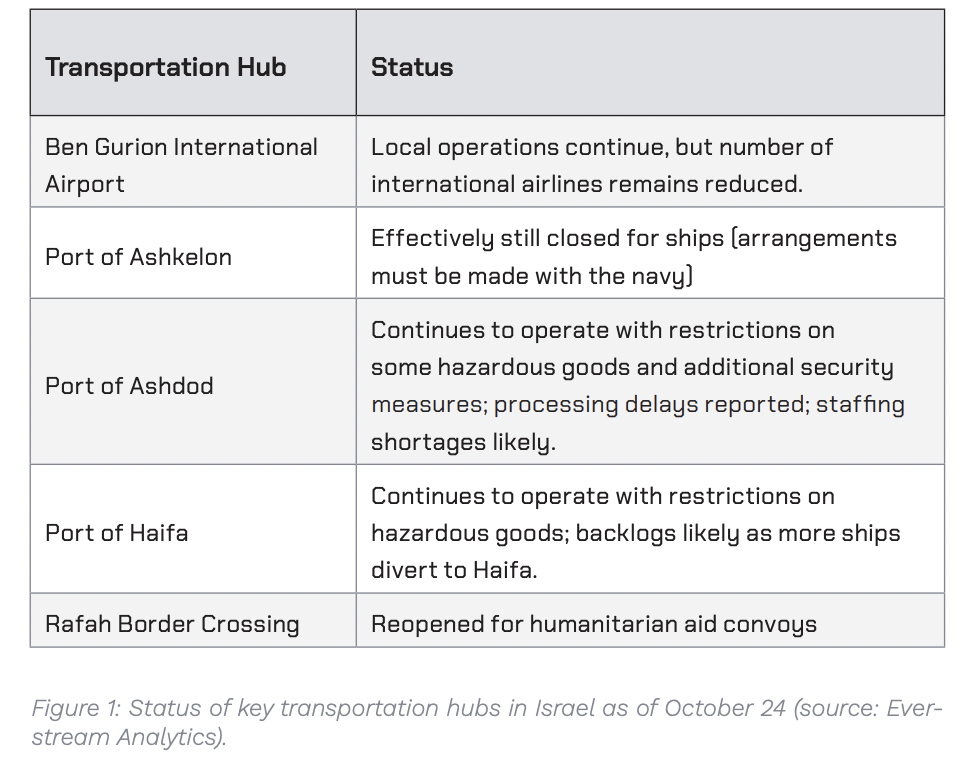
Transportation-related disruptions quickly became one of the most disruptive consequences of the growing Israel and Hamas crisis, according to a new report by Everstream Analytics, and their impact will likely intensify until tensions in the region begin to decrease.
The supply chain risk analytics company said in its recent report, "Impact of Israel Crisis Intensifies," that within the first three weeks of the crisis; impacts have been confirmed in Israel's road, air, and ocean freight networks, all of which are at risk of worsening further in the coming weeks.
"Ben Gurion International Airport in Tel Aviv, Israel's main international airport, continues to operate, but the backlog of airfreight items at the airport's storage and processing facilities is likely to increase," Everstream Analytics said.
It added that the list of international airlines suspending flight operations to and from Tel Aviv also continues to grow, and while the duration of the cancellations varies by airline, Royal Air Maroc, the flag carrier of Morocco, and Cathay Pacific Airways Ltd., the flag carrier of Hong Kong, were the latest major airlines that announced longer-term cancellations until the end of the month and the end of the year respectively.
"Flight operations could be further disrupted after insurers cancelled the coverage of unnamed Israeli airlines as concerns over related impacts of the conflict grow," the report said.
Everstream noted that airlines normally take out two types of policy, a policy that covers regular damages and passenger liabilities and a war policy that can cover terror or war-related losses.
Backlogs also to increase on seaports

It said that delays and backlogs are also "likely to increase at several of Israel's ocean transportation hubs," with the Port of Ashkelon effectively still closed for tankers.
Everstream noted that operations at the Port of Ashdod slowed down due to staffing shortages after 10% of staff were recruited into the army, as well as additional security measures and a ban on certain types of cargo at the port.
A similar ban at the Port of Haifa will contribute to shipping delays there as well.
"As more ships are likely to divert to Haifa, the number of ships waiting at the port should also be expected to rise until the security situation at ports further south begins to improve," the report said.
Everstream added that the movement along Israel's road network is also at risk of more disruptions, particularly in the areas around the Gaza Strip, where the Israeli army is preparing for a ground offensive, and in areas near the border with Lebanon, where skirmishes with Hezbollah are getting worse.
As clashes intensified, authorities declared the area within 4km (2.5 miles) of the Lebanese border a closed military zone and began evacuating 28 communities located within 2km (1.2 miles) of the border, the report said.
In another sign of the deteriorating security situation, the evacuation of Kiryat Shmona, a town of 22,000 people located around 2km (1.2 miles) from the Lebanese border, was announced on October 20, and evacuation of another 14 bordering communities on October 22.
"If the security situation deteriorates further, Israeli authorities will likely widen the evacuation zones even more, threatening to bring all civilian business and transportation activities in Israel's northern regions to a halt, likely with little to no advanced notice," Everstream added.
It noted that, similarly, the movement of goods and people in the areas around the Gaza Strip will be curtailed even more if the Israeli army goes ahead with its anticipated ground offensive into the enclave.
"If so, the movement of military personnel and equipment would have to be moved towards and into the enclave, possibly for weeks or even months," Everstream Analytics further said.



